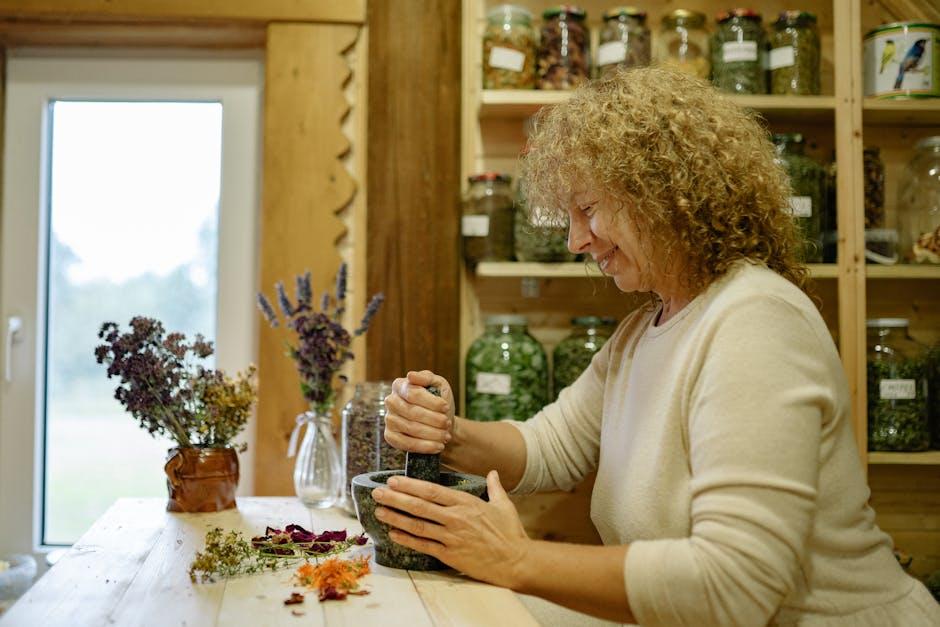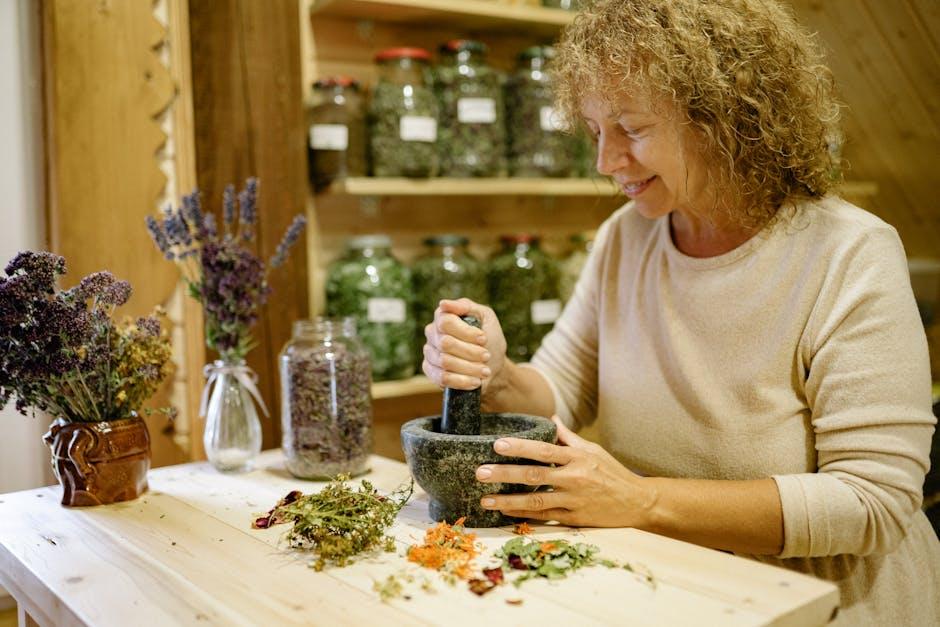In a world where convenience often leads us to reach for over-the-counter solutions, the timeless art of homemade remedies quietly persists in kitchens and homes alike. These age-old treatments, passed down through generations, offer a gentle embrace for common ailments-tending to headaches, colds, indigestion, and more with ingredients often found in our own pantries. Exploring homemade remedies not only connects us to natural healing traditions but also invites a mindful approach to wellness. In this article, we delve into simple, accessible cures that blend nature’s wisdom with everyday practicality, reminding us that sometimes, the best medicine is right at our fingertips.
Understanding the Power of Natural Ingredients for Everyday Health

Unlocking the benefits of nature’s bounty for daily wellness has been a time-honored tradition across cultures. Natural ingredients harbor a potent mix of vitamins, minerals, and antioxidants that work synergistically to support the body’s innate healing mechanisms. From soothing herbal infusions to nutrient-packed roots, these remedies offer a gentle yet effective alternative, helping to reduce reliance on synthetic compounds. Embracing such ingredients not only nurtures physical vitality but also fosters a closer connection to the rhythms of the natural world.
Incorporating these powerful elements into your daily routine can be surprisingly simple. Whether crafting a calming chamomile tea to ease stress or applying a cooling aloe gel to calm irritated skin, the versatility of natural ingredients makes them accessible to everyone. Here are some common natural ingredients and their everyday uses:
- Honey: Natural antibacterial agent ideal for soothing sore throats.
- Ginger: Helps alleviate nausea and supports digestion.
- Turmeric: Potent anti-inflammatory for joint and skin health.
- Lavender: Calms the mind and aids restful sleep.
| Ingredient | Primary Benefit | Common Use |
|---|---|---|
| Mint | Digestive aid | Tea for stomach relief |
| Garlic | Immune booster | Raw or cooked in meals |
| Chamomile | Relaxant | Herbal tea for sleep |
Soothing Remedies for Common Cold and Flu Symptoms

When battling a cold or flu, nature offers a trove of gentle yet effective solutions that soothe discomfort and support recovery. Among these, warm herbal teas like ginger, chamomile, or peppermint provide not only hydration but also calming effects for sore throats and congestion. Adding a spoonful of raw honey can boost antibacterial properties and ease coughs. Similarly, inhaling steam infused with eucalyptus or peppermint oils helps clear nasal passages, making breathing easier and reducing sinus pressure. Rest and humidified air also play vital roles in easing symptoms, encouraging the body to heal faster.
For those who prefer hands-on approaches, creating simple salves and compresses at home can bring relief. Applying a warm compress to the forehead or chest relaxes muscle aches and reduces headaches, while a teaspoon of apple cider vinegar diluted in water may help soothe a scratchy throat. Here’s a quick reference table of some beloved remedies:
| Remedy | Benefit | Method |
|---|---|---|
| Honey & Lemon Tea | Soothes sore throat | Mix in warm water |
| Steam Inhalation | Clears congestion | Use eucalyptus oil |
| Warm Compress | Reduces headaches | Apply to forehead |
| Saltwater Gargle | Relieves throat pain | Mix salt in warm water |
Gentle Solutions for Digestive Discomfort and Upset Stomach

When your stomach feels unsettled, turning to nature’s gentle helpers can offer substantial relief without the harsh side effects of over-the-counter medications. Among the most effective are herbal teas such as ginger, peppermint, and chamomile. Ginger, with its anti-inflammatory properties, helps soothe nausea and promote digestion, while peppermint relaxes digestive tract muscles, easing spasms and indigestion. Chamomile, renowned for its calming effects, not only reduces stomach cramps but also supports restful sleep, which is crucial for recovery.
Incorporating simple dietary habits can also work wonders. Try incorporating these easy-to-follow practices for comforting relief:
- Stay hydrated: Sipping warm water or electrolyte-rich fluids aids digestion and prevents dehydration.
- Eat small, frequent meals: This prevents overwhelming your digestive system and reduces bloating.
- Use natural probiotics: Yogurt and kefir promote healthy gut flora, enhancing digestion.
- Practice mindful eating: Chew thoroughly and eat slowly to reduce digestive stress.
| Remedy | Benefit | Recommended Use |
|---|---|---|
| Ginger Tea | Reduces nausea | 1 cup after meals |
| Peppermint Tea | Relieves cramps | 1 cup before bedtime |
| Chamomile Tea | Calms digestive muscles | 1 cup during discomfort |
Calming Techniques to Relieve Stress and Promote Restful Sleep

When the pressures of the day weigh heavily, it’s essential to find gentle yet effective ways to ground yourself and ease into tranquility. Breathing exercises, such as slow, diaphragmatic breaths, activate the body’s natural relaxation response, reducing cortisol levels and calming the nervous system. Complementing this, the practice of progressive muscle relaxation-systematically tensing and then releasing each muscle group-can dissolve residual tension stored in the body, priming you for peaceful rest. These simple rituals, performed consistently, become a restorative bedtime sanctuary that signals to your mind and body that it’s time to unwind.
In addition to these techniques, incorporating natural elements can amplify the sense of calm. Herbal teas infused with chamomile, lavender, or valerian root gently ease anxiety and prepare the body for sleep without the grogginess of pharmaceutical alternatives. Using a weighted blanket has also garnered attention for its ability to apply subtle pressure, mimicking a comforting hug that encourages serotonin production. Experimenting with these soothing aids alongside mindful techniques creates a personalized recipe for relaxation that nurtures both mental clarity and deep, rejuvenating sleep.
| Technique | Benefit | Time Needed |
|---|---|---|
| Deep Breathing | Reduces anxiety & calms the nervous system | 5 minutes |
| Progressive Muscle Relaxation | Relieves muscle tension | 10 minutes |
| Chamomile Tea | Promotes gentle sedation | 15 minutes before bed |
| Weighted Blanket | Increases serotonin & comfort | During sleep |
To Conclude
In the end, while modern medicine offers incredible solutions, the timeless wisdom of homemade remedies remains a gentle reminder of nature’s healing touch. These simple, accessible treatments connect us to traditions passed down through generations, empowering us to care for ourselves with ingredients found right in our kitchens. Whether it’s a soothing tea, a comforting poultice, or a dash of honey, embracing these remedies can add a layer of warmth and mindfulness to our approach to common ailments. So next time a sniffle or ache visits, consider reaching for nature’s gifts-you might just find that the simplest cures are also the most comforting.











